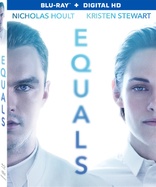Equals Blu-ray Movie
HomeEquals Blu-ray Movie 
Blu-ray + UV Digital CopyLionsgate Films | 2015 | 101 min | Not rated | Sep 06, 2016
Price
List price:Amazon: $14.99 (Save 40%)
Third party: $14.99 (Save 40%)
Only 4 left in stock (more on the way).
Movie rating
6.2 | / 10 |
Blu-ray rating
| Users | 4.0 | |
| Reviewer | 3.0 | |
| Overall | 3.0 |
Overview
Equals (2015)
A futuristic love story set in a world where emotions have been eradicated.
Starring: Nicholas Hoult, Kristen Stewart, Jacki Weaver, Guy Pearce, Rebecca HazlewoodDirector: Drake Doremus
| Romance | Uncertain |
| Sci-Fi | Uncertain |
| Drama | Uncertain |
Specifications
Video
Video codec: MPEG-4 AVC
Video resolution: 1080p
Aspect ratio: 1.85:1
Original aspect ratio: 1.85:1
Audio
English: DTS-HD Master Audio 5.1 (48kHz, 24-bit)
Subtitles
English SDH, Spanish
Discs
Blu-ray Disc
Single disc (1 BD)
UV digital copy
Packaging
Slipcover in original pressing
Playback
Region A (B, C untested)
Review
Rating summary
| Movie | 3.0 | |
| Video | 3.5 | |
| Audio | 4.0 | |
| Extras | 2.0 | |
| Overall | 3.0 |
Equals Blu-ray Movie Review
1982 + 2.
Reviewed by Jeffrey Kauffman August 31, 2016Stop me if you’ve heard (seen?) this before—well, never mind, I’ll stop myself, because no matter how you slice the whatever the future version of bread is, Equals owes a lot to George Orwell’s iconic 1984. Dystopian future society? Check. A collectivist society where individuals are merely cogs in a wheel? Check. A group of people intent on rewriting, or at least re-describing, history? Check. And two anachronistic souls who have the temerity to fall in love despite cultural proscriptions against such behavior? Check and double check. Equals boasts a story credit by Drake Doremus (who also directed) and a screenplay credit by Nathan Parker (Moon), but as someone who is neither an attorney nor who plays one on television, if I were representing the Orwell Estate, I’d be having some serious chats with the Writers Guild of America. In a way Equals tends to filter a lot of Orwell’s formulations through the prism of other dystopian future outings like Gattaca, with a genetic component to what’s going on, as well as medical monitoring to make sure that citizens fall within accepted limits of “normalcy”. In Equals’ slick, serene and stylish world, emotions have been genetically “removed” after some kind of apocalyptic showdown (the film only tangentially touches upon what brought Mankind to this current state of affairs). People now live alone, with sex replaced by “conceptions summons” for women who are (evidently) artificially inseminated in order to “grow the collective”. Touching is expressly forbidden and daily life is often a march of what seems like semi-lobotomized worker bees toiling in an ultra hygienic and really white environment. The film focuses on Silas (Nicholas Hoult), who works as an illustrator at a company called Atmos (maybe the Dolby folks can join the Orwell folks in any proposed litigation), which is evidently tasked with creating stories and/or histories to keep the citizenry occupied when they’re not at their jobs or playing the puzzle games that many seem to pass the time in their apartments with. As Silas zings from his domicile to work aboard a super sleek and very white subway, he affords himself the opportunity to watch “news” on one of the omnipresent touchscreens that are a major part of this future society. He’s accosted by what turns out to be ubiquitous warnings against “SOS”, or Switched On Syndrome, a “disease” which proceeds in various stages and which basically boils down to the fact that some genetic wiring misfires and individuals with the affliction begin feeling emotions. Guess what happens next?
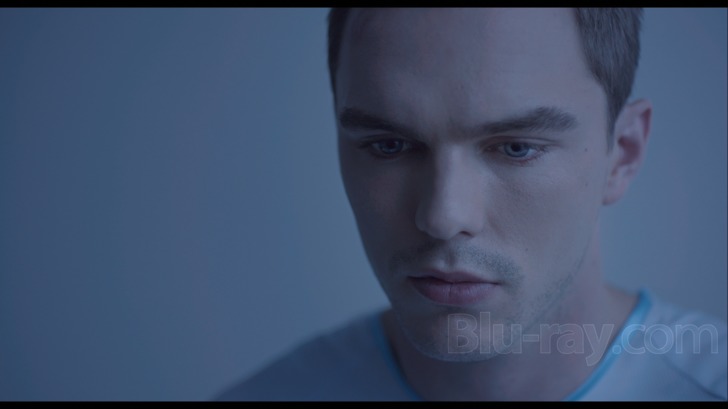
One of the interesting things about Equals is how it alludes to events without necessarily filling in all the details. The backstory of Mankind’s precipitous flirtation with extinction is detailed courtesy of snippets of Atmos’ writing and illustrating team, but there are other examples as well. The progression of Switched On Syndrome from Stage 1 (which is supposedly manageable with medication) to Stage 4 (which necessitates either suicide or euthanasia) gets handled via those touchscreen news reports, while the fact that despite placid exteriors many folks aren’t actually “happy” (or whatever the emotionless equivalent of that state is) is shown rather succinctly when some poor soul commits suicide at Atmos headquarters, and that leads to casual conversation about others who have similarly taken their own lives. Obviously, all is not well in this ostensible Eden.
It’s not exactly surprising when Silas starts showing symptoms of Switched On Syndrome, nor is it exactly a mind boggler when he starts pining for his coworker Nia (Kristen Stewart). In another completely predictable plot contrivance, it turns out Nia is herself afflicted with the disease, though she’s what is called a “hider”, not submitting to the medical regimen foisted off on other “infected” people like the obedient Silas. Will these two throw off the shackles of their oppressive society to discover the joys of forbidden love? What do you think?
A couple of subplots and/or sidebars unfold simultaneously to the patently odd bouts of heavy breathing between Silas and Nia (which all take place in a bathroom stall, albeit a really sleek one). The workers’ boss Leonard (David Selby, in a bit of cheeky casting that may offer some subliminal links to werewolves and vampires, Twilight Forever: The Complete Saga style) becomes suspicious about the two, threatening any chance of happily ever after. Meanwhile, Silas joins an underground “support” group which includes Jonas (Guy Pearce), a guy Silas meets at the doctor’s, and Bess (Jacki Weaver), another “hider” who actually works at the so-called “Den” where defects (those with SOS) are sent to either kill themselves or be killed.
There’s some interesting content in Equals, but it’s all couched in such a generally derivative context that its impact tends to be undermined. This future society’s ins and outs are never fully detailed enough to seem “real”, and in fact a lot of Equals tends to ply a kind of quasi- hallucinatory ambience that undercuts any perceived human emotion, something that is probably deadly to the film’s central thesis. There are interesting analogs to the hysteria surrounding the outbreak of AIDS (to cite one example), with the populace freaked out by those coming down with SOS. There’s also an at least somewhat interesting moment late in the film when a “cure” for SOS is announced, leading to a number of drastic decisions, but the film never generates much heat, something that is perhaps perfectly in tune with its depiction of an antiseptic, really white future.
Equals Blu-ray Movie, Video Quality 
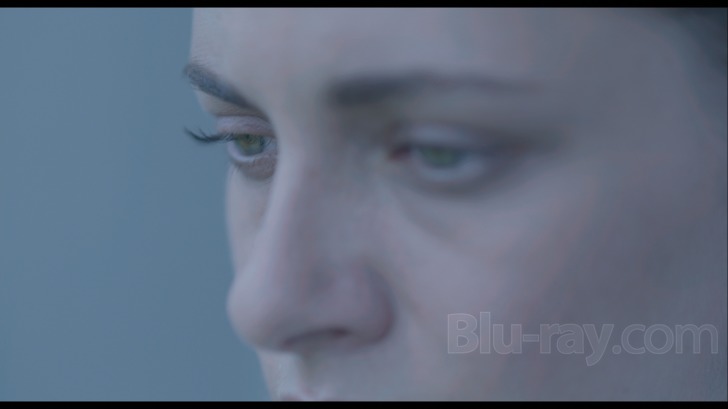
Equals is presented on Blu-ray courtesy of Lionsgate Films with an AVC encoded 1080p transfer in 1.85:1. It's a little hard to know how to assess the video quality of this release since it's obvious that director Drake Doremus and cinematographer John Guleserian are going for a highly stylized look (and unfortunately their commentary isn't overly detailed on how they achieved it). As can easily be seen in the accompanying screenshots, this digitally shot feature (Arri Alexa XT, according to the IMDb) is often color graded to within an inch of its life, with a lot of the film playing out in ice cool blue to violet hues that often tend to give flesh tones a purplish tint. Low light and/or low contrast often tend to deplete detail levels, but this transfer has an abundance of banding, typically in arcs which fill the background but which often even intrude onto faces, giving things a weirdly painterly appearance that is almost reminiscent of intentionally dreamlike ambiences in films such as Waking Life. A number of scenes that are shot in extremely low light conditions suffer from what I call "digital murk" (see screenshots 12, 16 and 17). In relatively decent lighting conditions, and when extreme close-ups are employed (as they often are), detail levels are generally excellent, though often in these extreme close-up situations, it appears that Guleserian was pulling focus on the fly, and as such parts of the frame will have at least the appearance of softness at times. On the plus side, there's no noise to speak of, even in low light conditions, and no issues with image instability.
Equals Blu-ray Movie, Audio Quality 
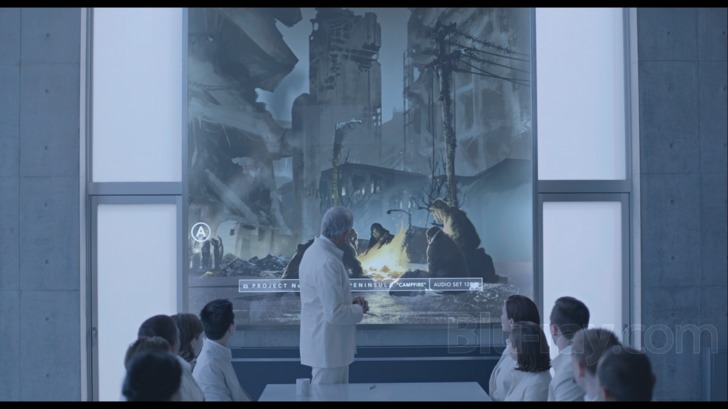
Equals is a filmed of strained silences and anguished glances, and as such its DTS-HD Master Audio 5.1 track really only gets to stretch out a bit when the pulsing minimalist score by Sascha Ring and Dustin O'Halloran is being utilized. Ambient environmental effects are minimal, leaving occasional discrete channelization for things like the gliding sounds of units that slide out of various apartment walls. Dialogue is cleanly rendered, and fidelity is excellent throughout the presentation. Because of the kind of numbed emotional ambience of the film, dynamic range is understandably static a lot of the time.
Equals Blu-ray Movie, Special Features and Extras 
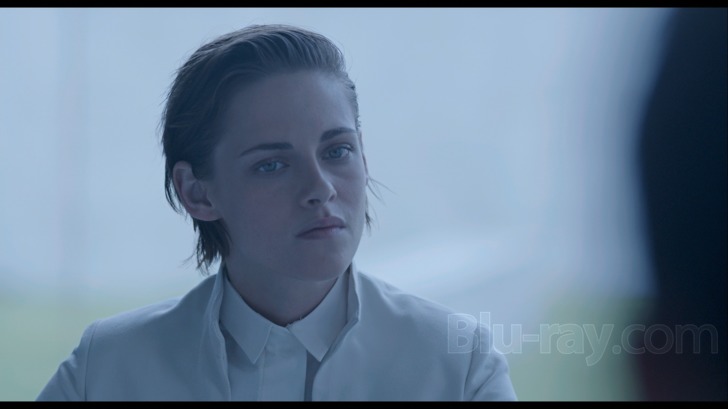
- Audio Commentary with Director Drake Doremus, Cinematographer John Guleserian and Editor Jonathan Alberts
- Switched On (1080p; 8:15) is pretty standard EPK fare, with interviews and film clips.
- The Collective (1080p; 13:35) has some good interviews with Stewart and Hoult.
- Utopia (1080p; 30:11) is a more in depth piece that covers aspects like the production design and some of the backstory that isn't actually overtly covered in the film.
Equals Blu-ray Movie, Overall Score and Recommendation 

Is Equals derivative? Undeniably. Does that mean it doesn't warrant any attention? That's a bit trickier, for a certain slack has to be cut for this feature to really resonate with any more force than a distant echo of 1984. But there are a number of interesting elements here, and for once Kristen Stewart's seeming genetic incapability to actually emote works for her character. The production design is quite, well, sleek and very white, giving an interesting visual allure to the film. With caveats duly noted, and with a recognition that video quality is odd (whether intentionally or not, I can't authoritatively say), Equals comes Recommended.
Similar titles
Similar titles you might also like

The Bad Batch
2016

Endless Love
2014

The Hurricane
1937

Salmon Fishing in the Yemen
2011

Phenomenon
1996

The Handmaid's Tale
1990

Daydream Nation
2010

Ethan Frome
1993

The Choice
2016

Romeo and Juliet
2013

Seeking a Friend for the End of the World
2012

Up Close & Personal
1996

God's Own Country
2017

The World to Come
2020

Othello
1995

All This, And Heaven Too
1940

Now, Voyager
1942

Inventing the Abbotts
1997

The Scarlet Letter
1995

The House of the Spirits
1993
